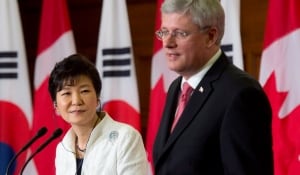In Ontario, it will be illegal to smoke at children's playgrounds, publicly owned sports fields and restaurant and bar patios as of Jan. 1.
As well, tobacco cannot be legally sold on university and college campuses.
The provincial government announced the ban in November.
It is one of a number of new laws and regulations — at both the provincial and federal levels — that are to take effect in the new year.
Here are seven ways life will change in Canada on Jan. 1.
1. Child care tax break for parents
Families with children under 18 will receive new tax breaks starting Jan. 1, though Ottawa won't begin paying them out until July, just a few months before the federal election set for Oct. 19.
The universal child care benefit per child under six is to rise from $100 to $160 a month or $1,920 a year. For each child six to 17 years old, families can also now receive a federal tax credit of up to $720 per year.
Those families will receive their first cheques in July, a lump-sum payment for the first half of 2015.
The Conservative government is also introducing a version of the family income-splitting promise it made in the 2011 election, to apply to the 2014 tax year. It will be capped at $2,000 per family.
And the federal children's fitness tax credit becomes fully refundable as of Jan. 1, which means families whose incomes are too low to pay taxes will still get money.
2. Fast-track immigration comes to Canada
Skilled workers who want to immigrate to Canada will be able to apply through a new "express entry" system that launches Jan. 1.
Would-be immigrants with a job offer go to the front of the line, as do applicants 20-29 years old with a PhD, language proficiency and past work experience in Canada.
With express entry, qualified applicants will be invited to become permanent residents, and Ottawa is promising the processing time for that should be about six months, compared to the current wait of about two years.
The government says giving preference to "only the candidates who are most likely to succeed — not simply the first to submit their application" — will better meet local labour market needs. Provinces and employers will be able to select people from the pool of applicants created by this new system.
Critics like immigration lawyer Richard Kurland say the government will now be deciding who the winners and losers will be in a system without "transparency, oversight, or accountability."
Quebec will not take part in the express entry system.
3. Higher tariffs on some imports
In a follow-on to the 2013 budget, new tariffs amounting to some $333 million annually will be applied to 72 countries, including such prominent consumer product exporters as Brazil, China, Indonesia, Mexico, Singapore and South Korea.
Those countries had been on a list of less developed countries that were subject to lower tariffs since 1974 but which are now considered "higher-income and trade-competitive."
Less than two per cent of imported goods will be affected, and certain high-profile consumer goods, such as iPods and MP3 players, have been exempted.
4. Free trade with South Korea begins

Korean President Park Geun-hye, left, listens to Prime Minister Stephen Harper respond to a question during a joint media availability in September after the two leaders formally signed a free-trade agreement. (Adrian Wyld/Canadian Press)
The Canada-South Korea free trade agreement comes into force Jan. 1. The Canadian government forecasts exports to Korea will increase 32 per cent.
The agreement is especially good news for Canadian cattle and pork producers. For example, the 40 per cent Korean tariff on Canadian beef will be gradually eliminated over 15 years.
The agreement was signed in Ottawa on Sept 22. Ottawa sees the pact with Korea as a stepping stone to other free trade agreements in Asia.
5. New anti-doping program for athletes
For athletes New Year's day is also when the new anti-doping code takes effect.
The revised Canadian Anti-Doping Program has some changes for specific drugs, sanctions and test procedures, but it also has a new offence: athletes are not permitted to work with coaches, trainers, physicians or other athlete support personnel who are ineligible because of an anti-doping rule violation.
The statute of limitations on doping goes from eight years to 10 years, so a decade-old violation of anti-doping rules can result in sanctions.
Administered by the non-profit Canadian Centre for Ethics in Sport, the changes are designed to ensure Canada is in compliance with the World Anti-Doping Code.
6. New rail safety requirement
Railway operating certificates from the federal government become mandatory Jan. 1, at least for new operators.
This new requirement for rail companies follows a recommendation of the Auditor General after the train derailment and explosions that devastated Lac-Megantic, Que. in 2013.

New safety regulations for railways, including some rolling out Thursday, have flowed from the tragedy in downtown Lac-Megantic, Que., in July 2013. (Paul Chiasson/The Canadian Press)
Now Transport Canada will have the power to shut down a railroad's operations without going to court. The ministry says a revocation will only happen if there is an extreme violation of the safety regulations.
On the other hand, should an extreme violation happen and the government not act, it may be held to account.
Transport Canada says it will take only an hour to complete the certificate, but it is giving existing railways two years to do so.
7. Abortion restrictions end in New Brunswick
Effective Jan. 1, New Brunswick is eliminating the restrictive rule that required women seeking a hospital abortion to have two doctors certify the procedure is medically necessary.
The change, which flowed from the closure of the private Morgentaler clinic in Fredericton in July, a September election and a change in government, will put abortion in the same category as any insured medical service.
Anda sedang membaca artikel tentang
New for 2015: Family tax breaks, smoking rules and more take effect Jan. 1
Dengan url
http://politikduniabarat.blogspot.com/2015/01/new-for-2015-family-tax-breaks-smoking.html
Anda boleh menyebar luaskannya atau mengcopy paste-nya
New for 2015: Family tax breaks, smoking rules and more take effect Jan. 1
namun jangan lupa untuk meletakkan link
New for 2015: Family tax breaks, smoking rules and more take effect Jan. 1
sebagai sumbernya
0 komentar:
Posting Komentar